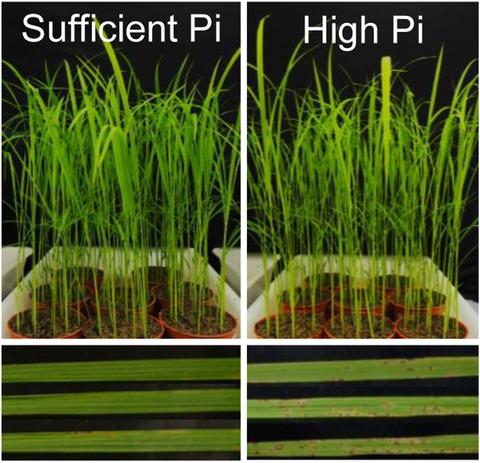当前位置:
X-MOL 学术
›
Mol. Plant Pathol.
›
论文详情
Our official English website, www.x-mol.net, welcomes your
feedback! (Note: you will need to create a separate account there.)
Phosphate excess increases susceptibility to pathogen infection in rice.
Molecular Plant Pathology ( IF 4.8 ) Pub Date : 2020-02-19 , DOI: 10.1111/mpp.12916 Lidia Campos-Soriano,Mireia Bundó,Marcel Bach-Pages,Su-Fen Chiang,Tzyy-Jen Chiou,Blanca San Segundo
Molecular Plant Pathology ( IF 4.8 ) Pub Date : 2020-02-19 , DOI: 10.1111/mpp.12916 Lidia Campos-Soriano,Mireia Bundó,Marcel Bach-Pages,Su-Fen Chiang,Tzyy-Jen Chiou,Blanca San Segundo

|
Phosphorus (P) is an essential nutrient for plant growth and productivity. Due to soil fixation, however, phosphorus availability in soil is rarely sufficient to sustain high crop yields. The overuse of fertilizers to circumvent the limited bioavailability of phosphate (Pi) has led to a scenario of excessive soil P in agricultural soils. Whereas adaptive responses to Pi deficiency have been deeply studied, less is known about how plants adapt to Pi excess and how Pi excess might affect disease resistance. We show that high Pi fertilization, and subsequent Pi accumulation, enhances susceptibility to infection by the fungal pathogen Magnaporthe oryzae in rice. This fungus is the causal agent of the blast disease, one of the most damaging diseases of cultivated rice worldwide. Equally, MIR399f overexpression causes an increase in Pi content in rice leaves, which results in enhanced susceptibility to M. oryzae. During pathogen infection, a weaker activation of defence‐related genes occurs in rice plants over‐accumulating Pi in leaves, which is in agreement with the phenotype of blast susceptibility observed in these plants. These data support that Pi, when in excess, compromises defence mechanisms in rice while demonstrating that miR399 functions as a negative regulator of rice immunity. The two signalling pathways, Pi signalling and defence signalling, must operate in a coordinated manner in controlling disease resistance. This information provides a basis to understand the molecular mechanisms involved in immunity in rice plants under high Pi fertilization, an aspect that should be considered in management of the rice blast disease.
中文翻译:

磷酸盐过量会增加水稻对病原体感染的易感性。
磷(P)是植物生长和生产力的必需营养素。然而,由于土壤固定,土壤中的磷利用率很少足以维持作物高产。为了规避磷酸盐 (Pi) 有限的生物利用度而过度使用化肥,导致农业土壤中磷含量过高。尽管对磷缺乏的适应性反应已被深入研究,但人们对植物如何适应磷过量以及磷过量如何影响抗病性知之甚少。我们发现,高磷肥施肥以及随后的磷积累会增强水稻对真菌病原体米霉感染的易感性。这种真菌是稻瘟病的病原体,稻瘟病是全世界水稻最具破坏性的病害之一。同样, MIR399f过表达会导致水稻叶片中 Pi 含量增加,从而增强对米霉的易感性。在病原体感染期间,水稻植株中防御相关基因的激活较弱,在叶片中过度积累 Pi,这与在这些植物中观察到的稻瘟病易感性表型一致。这些数据表明,Pi 过量时会损害水稻的防御机制,同时证明 miR399 可以作为水稻免疫的负调节因子。 Pi 信号和防御信号这两条信号通路必须以协调的方式发挥作用来控制抗病性。该信息为了解高 Pi 施肥下水稻植株免疫相关的分子机制提供了基础,这是稻瘟病管理中应考虑的一个方面。
更新日期:2020-02-19
中文翻译:

磷酸盐过量会增加水稻对病原体感染的易感性。
磷(P)是植物生长和生产力的必需营养素。然而,由于土壤固定,土壤中的磷利用率很少足以维持作物高产。为了规避磷酸盐 (Pi) 有限的生物利用度而过度使用化肥,导致农业土壤中磷含量过高。尽管对磷缺乏的适应性反应已被深入研究,但人们对植物如何适应磷过量以及磷过量如何影响抗病性知之甚少。我们发现,高磷肥施肥以及随后的磷积累会增强水稻对真菌病原体米霉感染的易感性。这种真菌是稻瘟病的病原体,稻瘟病是全世界水稻最具破坏性的病害之一。同样, MIR399f过表达会导致水稻叶片中 Pi 含量增加,从而增强对米霉的易感性。在病原体感染期间,水稻植株中防御相关基因的激活较弱,在叶片中过度积累 Pi,这与在这些植物中观察到的稻瘟病易感性表型一致。这些数据表明,Pi 过量时会损害水稻的防御机制,同时证明 miR399 可以作为水稻免疫的负调节因子。 Pi 信号和防御信号这两条信号通路必须以协调的方式发挥作用来控制抗病性。该信息为了解高 Pi 施肥下水稻植株免疫相关的分子机制提供了基础,这是稻瘟病管理中应考虑的一个方面。










































 京公网安备 11010802027423号
京公网安备 11010802027423号